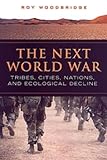The next world war: tribes, cities, nations and ecological decline [Libro electrónico] / Roy M. Woodbridge
Por: Woodbridge, Roy [autor/a].
Tipo de material: Libro
en línea Editor: Toronto Buffalo: University of Toronto Press, c2004Descripción: xv, 328 páginas ; 23 centímetros.ISBN: 0802086039; 0802088309; 9781442681897.Tema(s): Environmental degradation | Globalization -- Environmental aspects | Sustainable development | Human ecology | Economic development -- Environmental aspects -- History | Environnement -- Degradation | Mondialisation -- Aspect de l'environnement | Developpement durable | Ecologie humaine | Developpement economique -- Aspect de l'environnement -- HistoireNota de acceso: Disponible para usuarios de ECOSUR con su clave de acceso Nota de bibliografía: Incluye bibliografía e índice: páginas 297-318 Número de sistema: 54805Contenidos:Mostrar
Resumen:
Libro
en línea Editor: Toronto Buffalo: University of Toronto Press, c2004Descripción: xv, 328 páginas ; 23 centímetros.ISBN: 0802086039; 0802088309; 9781442681897.Tema(s): Environmental degradation | Globalization -- Environmental aspects | Sustainable development | Human ecology | Economic development -- Environmental aspects -- History | Environnement -- Degradation | Mondialisation -- Aspect de l'environnement | Developpement durable | Ecologie humaine | Developpement economique -- Aspect de l'environnement -- HistoireNota de acceso: Disponible para usuarios de ECOSUR con su clave de acceso Nota de bibliografía: Incluye bibliografía e índice: páginas 297-318 Número de sistema: 54805Contenidos:Mostrar
Resumen:| Tipo de ítem | Biblioteca actual | Colección | Signatura | Estado | Fecha de vencimiento | Código de barras |
|---|---|---|---|---|---|---|
| Libros | Biblioteca Electrónica Recursos en línea (RE) | Acervo General | Recurso digital | ECO400548058755 |
Incluye bibliografía e índice: páginas 297-318
Preface.. Part I: The enemy is ecological decline.. A shift in the angle of vision.. Provisioning societies.. Part II: From common genes to the global economy.. Round One: The spread of hunter-gatherer societies.. Round Two: The rise and spread of agricultural societies.. Round Three: Urbanization.. Round Four: From city-states to nations.. Round Five: Reliance on global business networks.. The organization and potential of round five.. Part III: The twenty-five-year challenge to growth and social Stability.. From egalitarian tribes to global inequity.. Ecological roadblocks to growth and poverty reduction.. The catalysts of calamity.. Part IV: The war to provision the world.. Our common enemy.. Mobilizing nations for war.. Mobilizing the international community.. Round Six: the age of global provisioning.. Notes.. Bibliography.. Index
Disponible para usuarios de ECOSUR con su clave de acceso
Preoccupied with the war on terrorism, we have lost sight of a more dangerous enemy of social peace and progress? The inability of the world's people to access the ecological goods and services they need to maintain and build their societies. By 2025, the combined demands of continued economic growth and the reduction of global poverty will require, annually, the ecological equivalent of three or four Earths. If history is our guide, the options for meeting these enormous 'provisioning' needs are extremely limited. Like the tribes, cities, and nations of earlier times, we can fight our neighbours for privileged access to declining ecosystem goods and services. This confrontation will inevitably pit the wealthy beneficiaries of the global economy against the billions of excluded, and lead to accelerated ecological collapse, the derailment of growth, and social chaos. The only alternative to this dismal prospect is to mobilize on a scale as if for war in order to meet this provisioning challenge on the battlefields of directed technological innovation. InThe Next World War, Roy Woodbridge argues that the international community must redirect present sustainable development and poverty reduction efforts in ways that place the provisioning of societies at the heart of political decision-making. To move this highly focused agenda forward, he calls on the United Nations to convene a World Forum on Global Provisioning to declare war on ecological decline and set the battle plans for the next world war? The war to equitably provision continued growth. eng
Disponible en línea
Disponible en formato PDF
Subscripción a ELSEVIER 26 de diciembre del 2013
